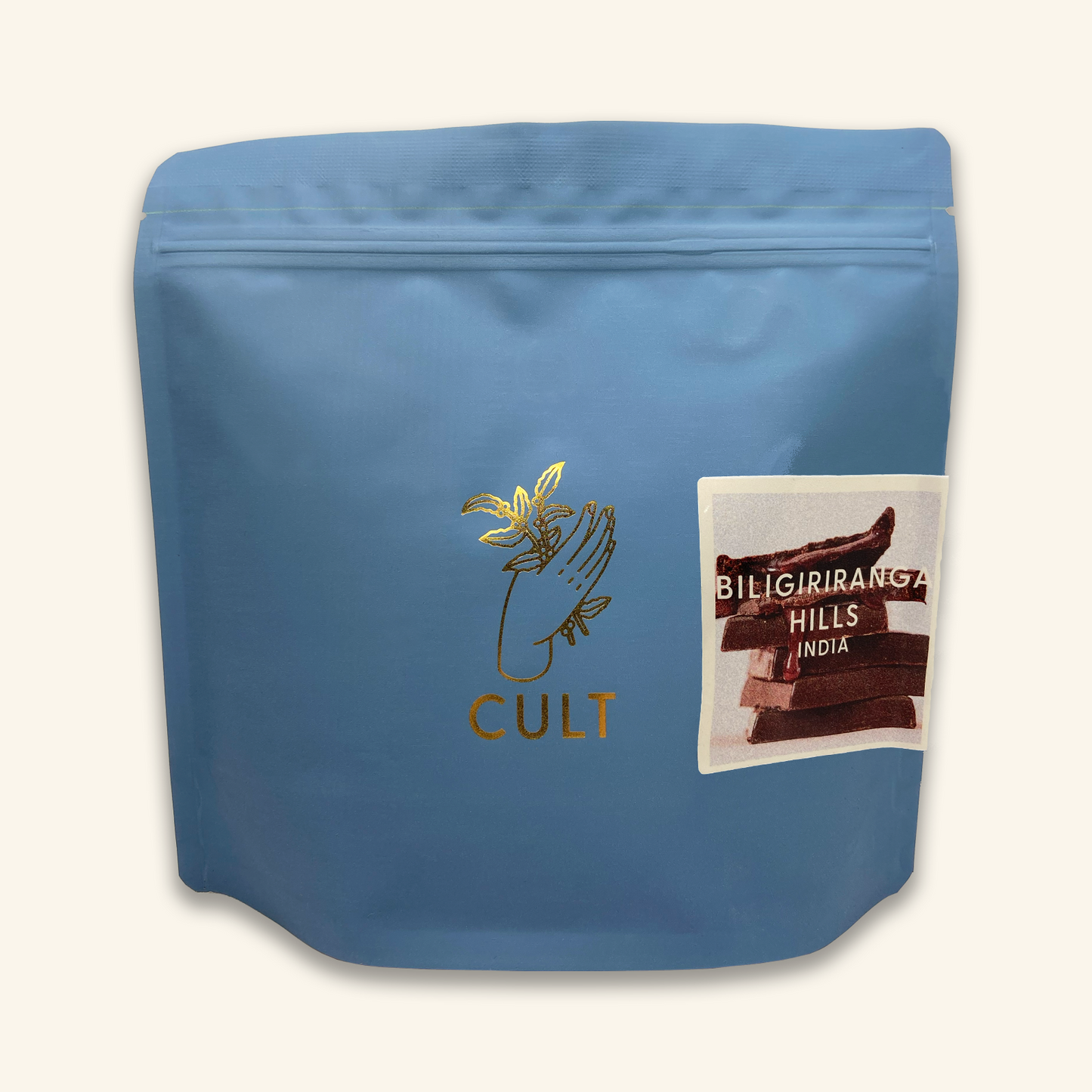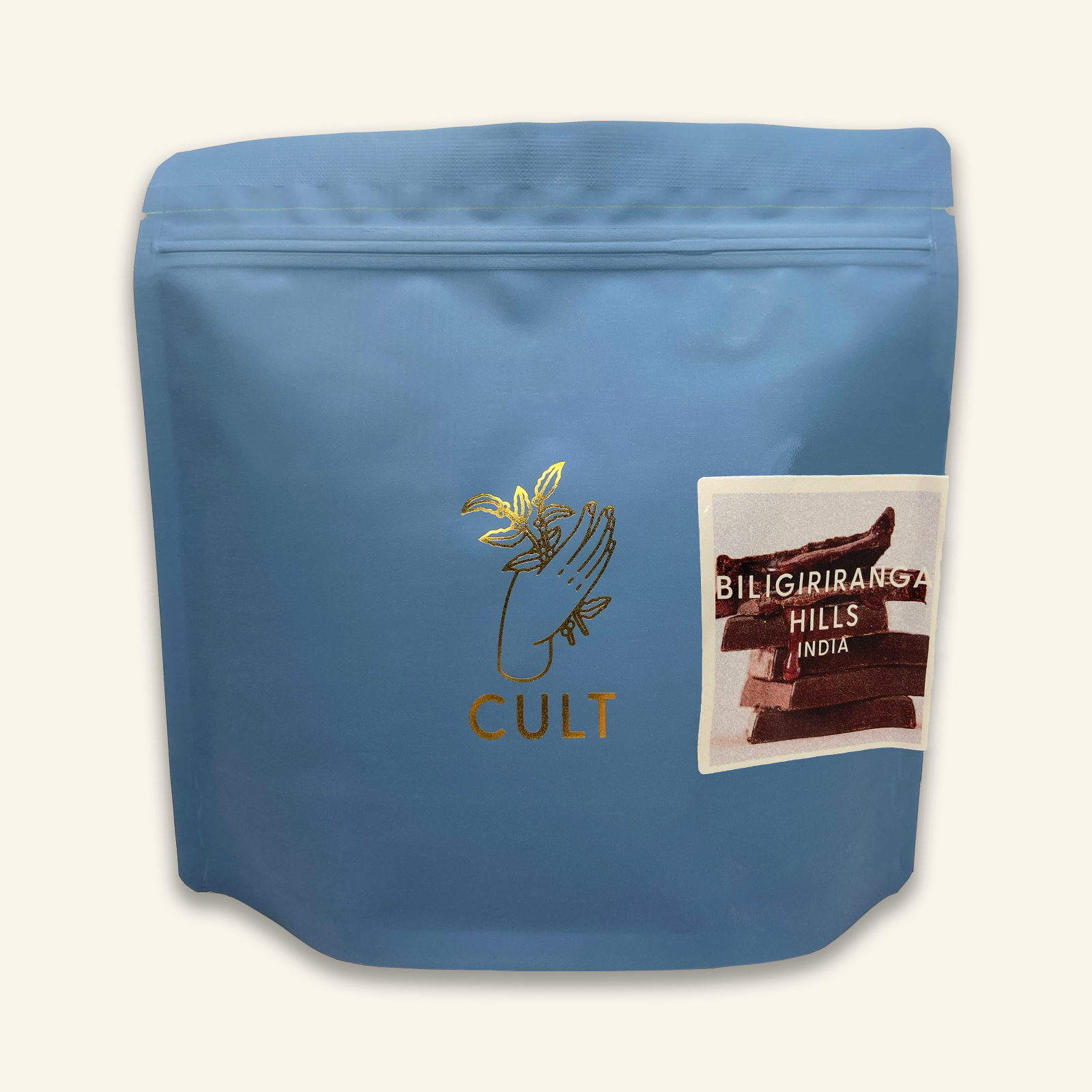Cult Espresso
BILIGIRIRANGA HILLS - INDIA
BILIGIRIRANGA HILLS - INDIA
Couldn't load pickup availability
| TASTE | RED BERRY, RED APPLE, BAKING SPICE AND DUSTING COCOA |
| ORIGIN | CHIKMAGALUR, KARNATAKA, INDIA. |
| FARM/MILL/CO-OP | BILIGIRIRANGA HILLS |
| VARIETAL | CHANDRAGIRI, S795/S9 |
| PROCESS | HONEY ANAEROBIC |
| ALTITUDE |
1300-1500 MASL |
| PARTNER |
INDOCHINA |
Biligiriranga Hills literally means ‘white hills’ in the local language, Kannada, and refers to the white rock face on one of the largest hills, crowned with the temple of Lord Ranganathaswamy (Lord Vishnu). Located where the Eastern and Western Ghats meet, this is a highly protected area in the Sathyamangalam Wildlife Sanctuary. It hosts a huge diversity of fauna and flora and has also been a tiger reserve since 2011
Read more
Ekata are a team of coffee professionals with an ambition to take Indian specialty coffee to the world. Created by seven childhood friends from Kerala, Ekata started in 2016 with a mission to see single-origin, shade-grown coffee in biodiverse terroir processed to international standards of quality.
Emerald Haven is a 280 acre plantation, owned and run by the Emerald Group for 15 years. During this time, they have been dedicated to giving back to the community, building schools and temples. Working in partnership with Ekata on the post harvest processing, has resulted in this specialty grade coffee.
COFFEE PROCESSING
1 . Harvesting: Selective harvesting of cherries at the maximum maturity stage.
2 . Sorting: Cherries are sorted before being pulped and dried with 40-50% mucilage remaining on the bean.
3 . Fermenting: The coffee undergoes anaerobic fermentation until optimum pH levels are achieved.
4 . Drying: The coffees are dried for 15 - 20 days on raised beds.
ABOUT SPECIALTY COFFEE IN INDIA
India has been one of the world’s major producers of coffee for a long time – since the days of the Mughal empire, some 200 years before tea was introduced under British colonial rule.
The well-known legend of coffee’s arrival in India has it that 16th century Sufi saint, Baba Budan, so enthused by coffee when travelling through the Middle East during his Hajj, smuggled seven coffee beans from Yemen (supposedly hidden in his beard) and planted them in Chandragiri, a hilly region located back in his home state of Karnataka.
Today, this area is known as Baba Budan Giri (literally, ‘Baba Budan Hills’) and India is now the third-largest producer and exporter of coffee in Asia, and the sixth-largest producer in the world.
In terms of quality, India offers significantly more than the famed Monsooned Malabar and commercial grade Robusta that many associate coffee from this country with. Some of the world’s most biodiverse coffee farms are to be found here, with shade provided by long-established indigenous tree canopies. With the combination of these excellent growing conditions and the relatively recent focus on high quality processing, we are now beginning to see some of the most exciting Asian specialty coffees emerging from here.
Coffee is traditionally grown in the Western Ghats, an epic mountain range spread over Karnataka, Kerala and Tamil Nadu. Karnataka is by far the largest producing area, accounting for about 70% of the total coffee production, with Kerala and Tamil Nadu accounting for around 23% and 7% respectively.
The majority of Indian coffee is exported, providing a significant contribution to the Indian economy among other plantation crops. Over a million people are involved in the Indian coffee industry, with around 250,000 farmers working on over 52,000 coffee plantations – the vast majority of whom are ‘small growers’ (around 85%) working with less than 10 acres. Around 60% of coffee grown in India is Robusta, with the remaining 40% Arabica and some Excelsa. Indian Robusta is particularly favoured for its superior mixing qualities, adding depth and finish, especially for espresso blends.




